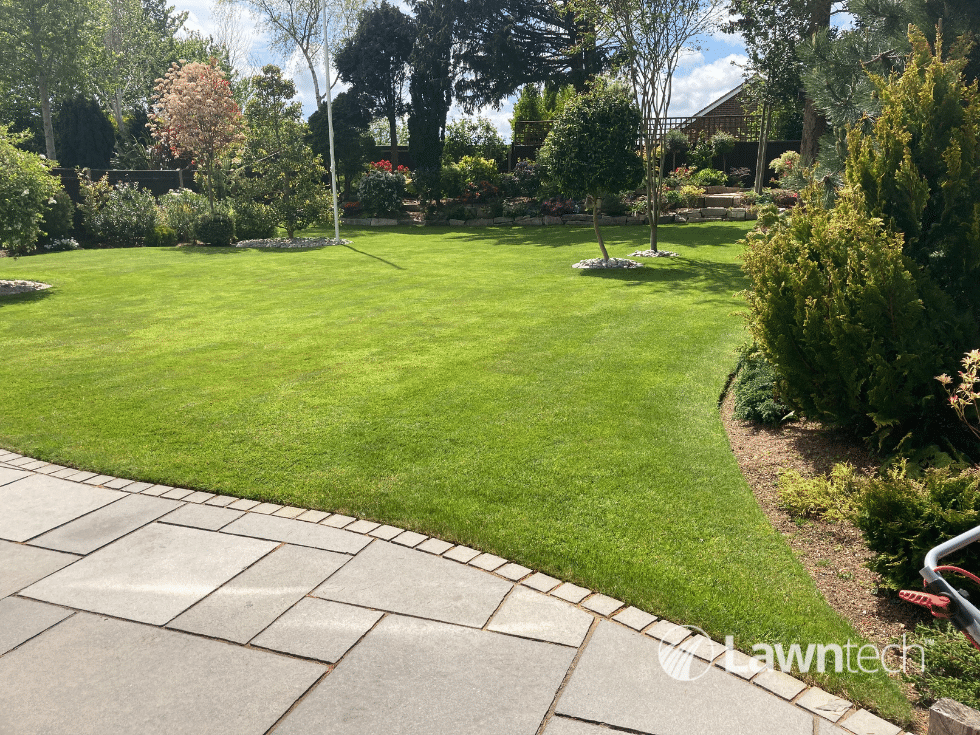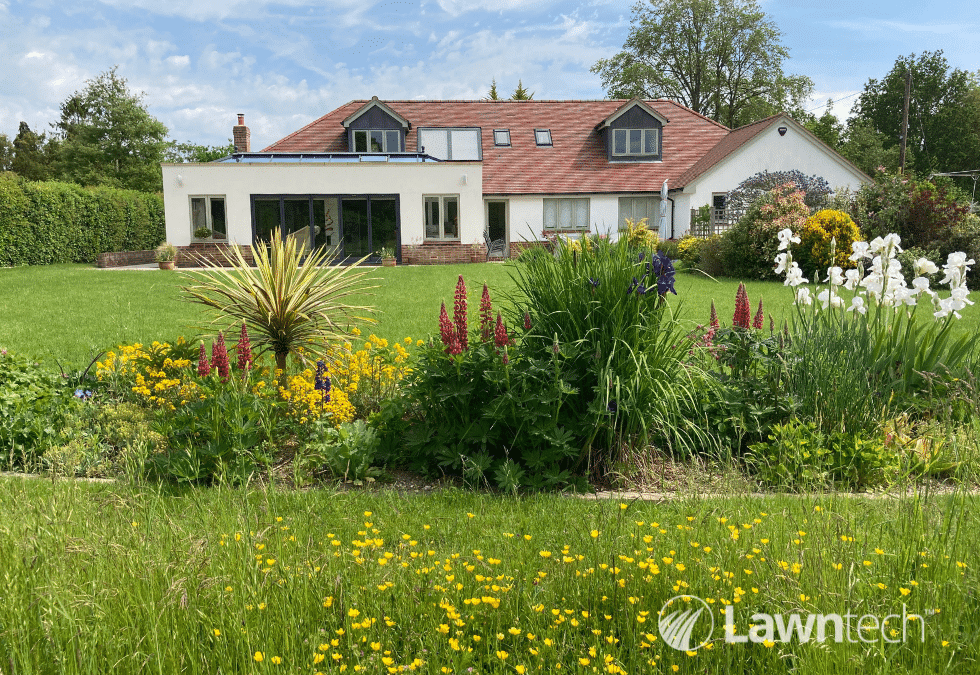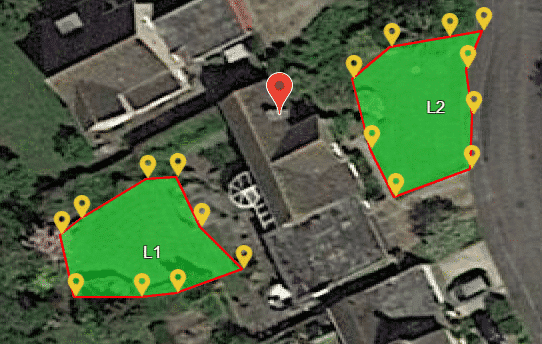Naturally, here at Lawntech we all love our lawns and our clients do too. Aside from the obvious aesthetic appeal and calming mental health benefits of a lush, green expanse of healthy grass, there are some important advantages to formal lawns which you may find surprising. Our answer to the headline question is a resounding “YES!” Of course we need lawns, and here are some good reasons why…
Lawns filter the air you breathe
Like all plants, grass absorbs Carbon Dioxide, Sulphur Dioxide and other airborne pollutants which are harmful to humans (and our environment), replacing them with the oxygen which we need to survive. Trees are often described as being the ‘Lungs of the planet’, and lawns are doing their bit too. Research by The Lawn Institute shows that here in the UK, a 150 square metre natural grass lawn will produce enough oxygen every day to sustain a family of four people.
In addition to absorbing those pollutants, your lawn will also clean the air you’re breathing by trapping particles of dust and smoke. If you’ve ever seen a thick layer of dust left on your patio or parked car after a storm, you’ll be glad you haven’t ingested it! That’ll be thanks to your lawn, at least in part. The lawn’s filtering properties help to lessen the amount of dust which would otherwise be all over the windows and doors of your house, too.
Lawns filter rainwater
A healthy, thick, well-aerated lawn will also help hold on to rainwater, by keeping it in the roots and soil rather than letting it all soak away. You’ll no doubt have seen how storm water races across paved areas unchecked, running straight off to the nearest storm drains and beyond, through to the network of sewers. On its way it will have collected all sorts of detritus, from soil and plant life to gravel and mulch. All of this flotsam and jetsam can mount up very quickly to block the storm drains altogether, causing flash floods and chaos in all directions. A healthy lawn, on the other hand, will hang on to much of that rainwater and filter out pollutants, preventing them from going on to cause harm to wildlife and the local environment.

A Lawntech formal lawn, affording its owner all the benefits to be found in this article.
Lawns enhance soil structure
A healthy, strong lawn improves the quality of the soil in which it grows, by keeping it loose and staving off compaction. A compacted lawn prevents rainwater from draining away, leaving it nowhere to go other than pooling on the surface. This is problematic at the best of times, much more so in floodplains and areas which depend on rain for drinking water. This is not a major handicap for most of the UK under ‘normal’ circumstances but in climatic extremes it can exacerbate an already difficult situation. The pores in the soil through which the grass grows are key to helping the soil stay friable and crumbly, allowing the lawn to stay well drained.
Lawns reduce noise pollution
Have you ever noticed the difference in noise between a built-up area like a town or city versus a quiet village? OK, so the latter may not have the sheer number of humans passing through it, with all the attendant racket that accompanies them, but it is a fact that tall buildings with hard exteriors and paved surroundings will make sound reverberate off them while a house with an adjacent lawn will do so much less readily. Perhaps a better comparison would be between two school buildings; one with a paved playground outside and the other with a grass playing field. The grass-fronted building would project a fraction of the unwanted noise reflecting off the all-concrete environment. The same is true of residential neighbourhoods. Anyone who has lived in a clanging, concrete-faced setting will tell you how much quieter things are with a green space nearby, acting like an insulating panel. It’s much like adding carpet to a previously empty, echoing room.
Lawns make your garden cooler
Admittedly this is less of a consideration here in the UK than it is in hotter countries, but a garden with a lawn in it will be cooler than one without. You may have felt the difference when stepping between your patio and lawn on a warm summer day. Towns and cities, with all the aforementioned concrete, will always be hotter than nearby rural areas, and much of this will be down to the effect of plant life. Grass, trees and other plants make an environment significantly cooler than the buildings adjacent to it, as concrete and other hard surfaces absorb and hold on to the heat while airflow around plants allows them to transpire. This is nature’s way of evaporating the moisture in the grass’ blades, enabling it and the air around it to stay cool. A study by Melbourne University found that this process can reduce air temperature by up to 9 degrees, making it a genuine help on a hot summer day.
Lawns provide a habitat for wildlife

A Blackbird feasting on a Chafer Grub, which it would not have found here without the lawn being present.
While a formal lawn may not provide a habitat for as diverse a range of wildlife as a wildflower meadow, it will nevertheless be alive and teeming with life in all its varied forms. From insects and invertebrates to birds and mammals, all happily finding plenty to attract them to your lawn. To say nothing of those beneficial bacteria and microbes which keep the circle of life turning. Compare and contrast this with hard landscaping and artificial turf, which will struggle to sustain any positive lifeforms at all!
Lawntech is an approved supplier and installer of Wildflower Turf, for more details please visit this page on our website:
All of the above are healthy, compelling reasons why lawns are really beneficial to us and our environment.
__________________________________________
Lawns under fire
In the USA (where the lawncare industry first rose to prominence), there have been voices of dissent raised about the alleged negative effect which lawn care has on the environment. Amid claims that more than 580 million gallons of fossil fuel are used per year to power America’s lawn mowers and 17 million gallons are spilt in the process of filling them (more than was lost in the infamous Exxon Valdez tanker disaster!), lawns are coming under fire and being blamed for everything from harbouring and spreading toxic chemicals, to causing air and noise pollution.
Aside from the fact that viable alternatives to petrol-powered mowers are already in use over here, it is fair to say that our American colleagues are still using pesticides on lawns for grubs and insects, which we have not been doing here in Europe for some years. This gives ammunition to those in the USA with objections on environmental grounds, but is not a criticism that can be levelled at us here in the UK. While Lawntech’s standard Lawn Treatment Programme still uses a limited amount of chemical weed control, we take our environmental impact very seriously and only spot-treat weeds wherever possible. We will only ever blanket-treat weeds on a lawn as a last resort. Other than weed control, all our treatments are either organic or semi-organic, and for those clients whose goals match our own we offer a fully Organic Lawn Care Programme. At a stroke, this shuts down the principal objection of those who claim that lawns are bad on environmental grounds. As you can see from the above, they are anything but!
Demand for lawn care in the UK is expanding, as more and more homeowners see the appeal of having a healthy lawn on their properties. We recently published a blog post about the ‘No Mow May’ campaign, and our stance remains the same today; we support and encourage any activity which improves conditions for the advancement of wildlife in all its forms, while giving our clients the opportunity to enjoy the best of both worlds. The ‘No Mow May’ campaign was based around ceasing the cutting of formal lawns with a view to rewilding them, in turn attracting wildlife to an area that by inference was deterring it while being maintained formally. Our view is that there is a compromise to be made. Wherever space permits, we advocate keeping some area managed as a wildflower meadow while enjoying the huge benefits of a formal lawn elsewhere in the garden. They are by no means mutually exclusive, after all, and our clients can enjoy the benefits of having a formal lawn while doing their bit for wildlife conservation.
Despite the ill-informed voices being raised, lawns are a huge benefit to us all, not just those fortunate enough to have them on our properties. Lawn care is very much here to stay and is evolving all the time, incorporating new practices to improve the impact it has on the environment around us.
If you would like a quote for an Organic Lawn Care Programme for your lawn, please Contact Us with your details, and we will be delighted to help.
To measure your own lawn and get an instant, no-obligation quote for our stand Annual Lawn Care Programme, please click here…



